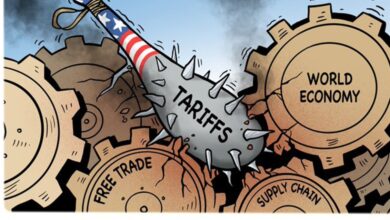Impact Of Government Rules On Stock Markets Volatility And The Need For Stock Exchanges For Economic Growth.
Stock markets are good indicators of receptivity to government rules, and volatility has been and will continue to be induced by government policies across global economies.

Stock markets play an important part in the development of an economy’s growth, and because of the relationship between the two, large government regulations cause volatility in stock markets.
Regulations in India and the Stock Market.
Since the outbreak, the Indian stock market has been quite volatile, notably in 2022. One of the most important elements at work here, and in foreign economies like the United States and Europe, is persistently high inflation and central bank actions aimed at reducing it, like quantitative tightening and rising interest.
Furthermore, ongoing geopolitical tensions between Russia and Ukraine weighed on oil prices and mood, and government rules on gasoline pricing and rate action caused the Sensex to see 1,000-point intra-day rallies and fall at least 14 times last year.
The effect on Government Regulations US markets.
With highly sticky inflation and anxieties of a downturn, the United States had a tumultuous year on par with India and other economies. The instability and eventual slide were caused by concerns about rising interest rates, lethargic economic growth, and high inflation, which provoked vehement responses from the government and regulatory agencies. The US Federal Reserve raised interest rates five times in 2022, with the rate varying from 4.25 to 4.5% till December. The persistent struggle against inflation, along with anxieties of a recession, has resulted in market volatility, with IT companies faring poorly.
Markets stay volatile while we enter 2023, with fears of rate hikes jeopardizing market sentiments and government liquidity, eventually curbing the already slowing economy. The stock market is a good indicator of receptivity to government rules, and volatility has been and will continue to be induced by government policies across global economies.
How market volatility is affected- The example of developed economies.
Consider the matter of global economic powerhouses like the United States and Japan. When the pandemic began to spread in early 2020, global governments implemented preventative measures like lockdowns and social isolation. The collapse was so killing that it was compared to the 2008 financial crisis. The scenario was similar in both the UK and Germany, showing a global crisis as a result of government laws in response to the pandemic.
:max_bytes(150000):strip_icc()/How-governments-influence-markets_color_rev-a0f613b7ef684cba868aac7efb8818fc.jpg)
When compared to December 2019 numbers, the Japanese market index fell by 20%. In response to this decline, global authorities studied and implemented quantitative easing, and a drop in key interest rates, in an attempt to stimulate the economy and, as a result, the stock markets. The impact was again obvious, with global stock markets reclaiming lost ground and signaling a positive trend beginning in April 2020. These cases display the effect of government rules on stock market volatility.
The stock market’s contribution to economic growth.
Stock markets that function properly promote economic growth and development by easing the mobilization of financial resources and connecting people who need money to innovate and expand with those who have the resources to invest. They do it in a controlled, secure, and transparent setting. The national exchanges also strive to promote good corporate governance in their listed issuers, fostering openness, accountability, and respect for shareholders’ and key stakeholders’ rights.
Investments in financial or product markets (agricultural, real estate, manufacturing, etc.), are an important engine of economic commerce, growth, and prosperity. As governments focus on measures that foster an investing culture, such as reduced interest rates, stock markets are gaining importance as a sought destination for investors. More folks want to invest in firms with high growth potential. You don’t have to look any further than Warren Buffet, one of the world’s richest men, to see that stocks make billionaires.
How are stock markets a helping hand for investors?
Stock exchanges are massive auction houses for investors. Every day, investors buy and sell their stocks. Securities are thus a liquid investment. When an investor wants to sell their investment, it is simple to locate a buyer. Other assets are even more difficult to dispose of. If you bought an investment property, it might take some time to locate a buyer and receive your money back. Investors can find a buyer for their securities on the same day.

How do stock markets help governments as well?
Stock exchanges serve as a trading platform for governments. A municipal, state or national government may require more funds to create a community housing estate, construct a water treatment plant, or launch any other public initiatives. Instead of raising taxes to generate the necessary money, it can issue bonds on the stock market. When investors purchase these bonds, the government can obtain the funds required to begin various initiatives that can lower living costs or even create jobs for residents. Long-term, this is advantageous for the economy.
What would happen in there were no stock exchanges?
Without stock exchanges, firms would have to rely on massive loans that must be returned with interest. Fortunately, firms in both the developed and developing worlds may offer shares to the public, raising large sums of money with no payback obligation. (public corporations are under no need to pay dividends, especially when they experience losses). Businesses with such cash may simply expand their operations and create new job possibilities. From a national standpoint, this will reduce unemployment and allow the government to receive more cash from company taxes.
The last call.
While there were winners and losers in this turbulent environment, India was able to maintain its strength and did much better than other rising economies. Despite global recessionary worries and a sustained rise in interest rates, India’s economy remained essentially constant, albeit with a modest downward trend. And hence, Indian equities and Indian Stock Market stand straight in these painful times of global recession.
Edited by Prakriti Arora





